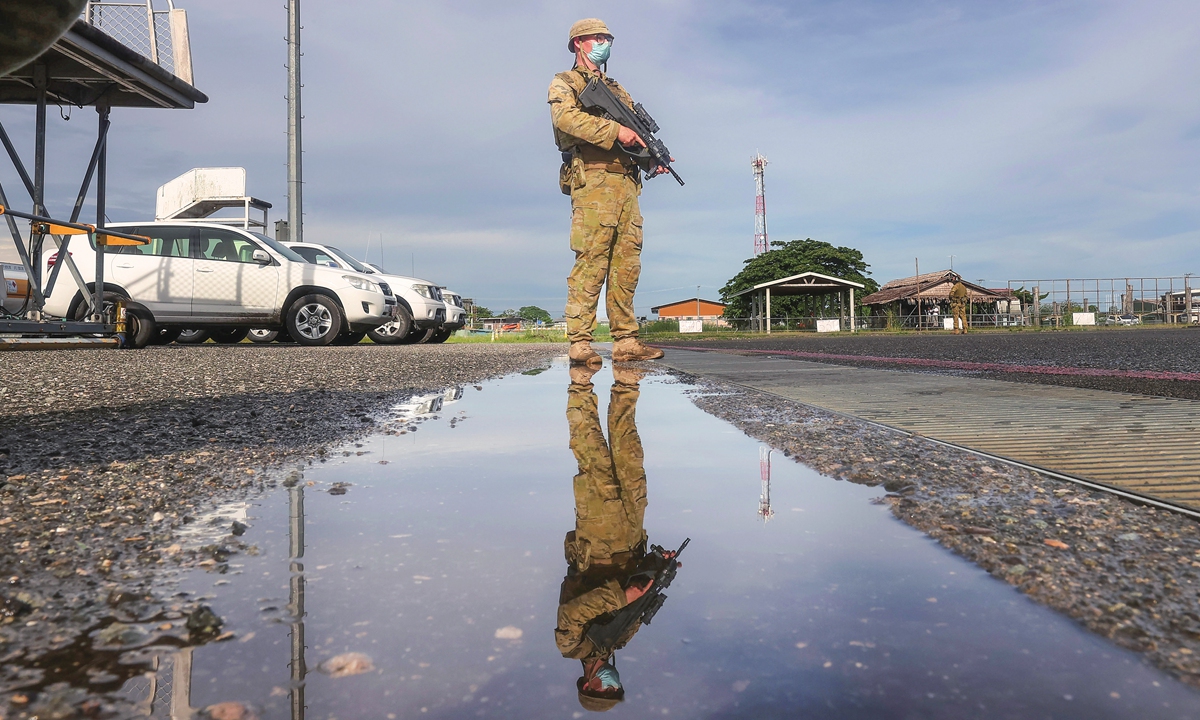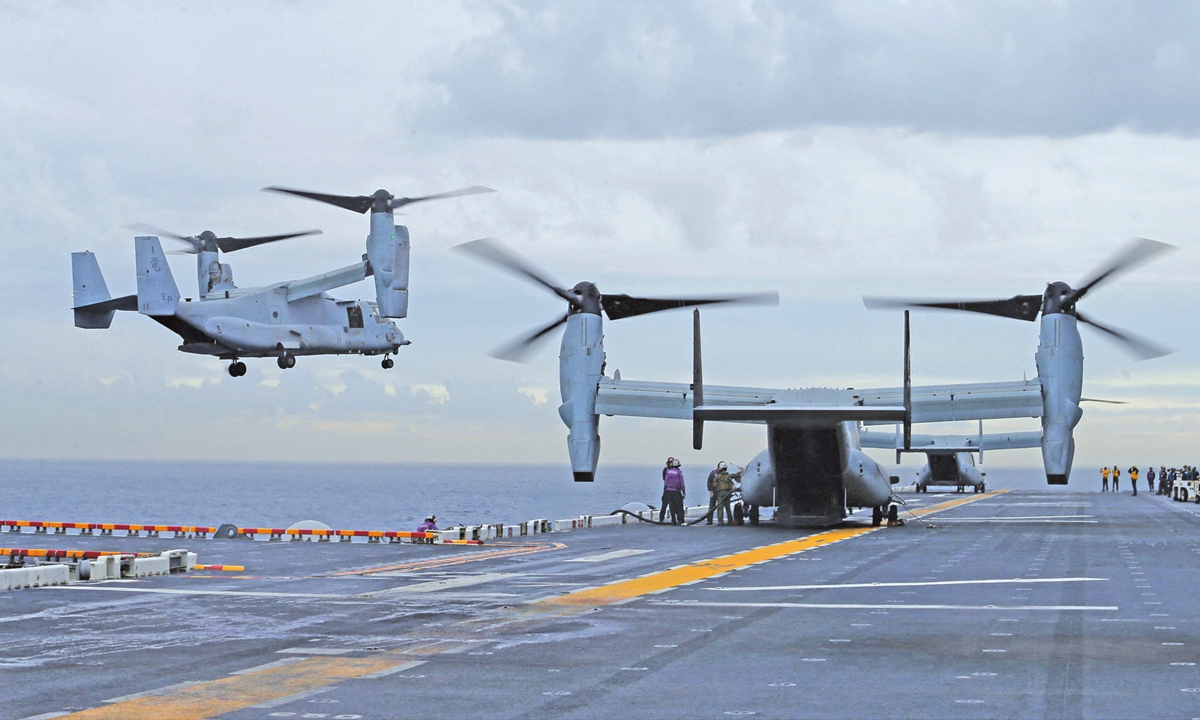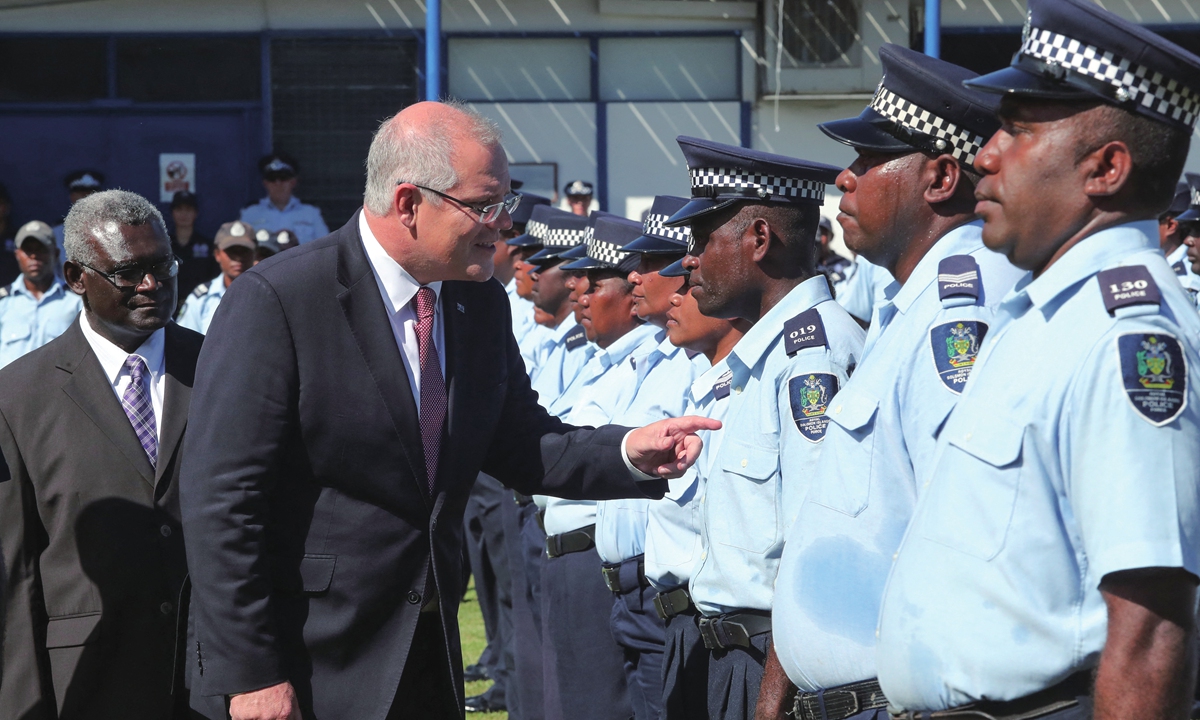
An Australian soldier stands on the tarmac at Honiara Airport, Solomon Islands, Tuesday, November 30, 2021. Photo: VCG
For decades, Australia, the "manager" of the United States in their perceived South Pacific region "backyard," has blatantly projected its expansive hegemony by treating island nations as vassal states.
Although the region has been "neglected" by the US and Australia for long, when China attempts to cultivate normal cooperation and economic exchanges there, Canberra, Washington, and their allies are unrelenting in their hysteric attacks against China.
The security pact signed in late March between China and the Solomon Islands has been constantly obstructed by Australia, the bully in the South Pacific, backed by the US. In a row, Australian and American envoys have visited the island country, trying to pressure it to quit cooperation with China.
The Solomon Islands is now at the center of attention but its Prime Minister, Manasseh Sogavare, has refused to compromise and called the denunciations from the West "insulting."
"Australia has always viewed the South Pacific region as its own backyard, treating island countries as vassal states with a colonial mentality," said Chen Hong, president of the Chinese Association of Australian Studies and director of the Australian Studies Center at the East China Normal University.
Trying to revive the Monroe Doctrine in the South Pacific region will get no support and lead to nowhere, Wang Wenbin, spokesperson of the Chinese Foreign Ministry said on Monday.
Experts noted that countless precedents have proved that when the US and its allies launch such an intensive "diplomatic siege" and "public opinion bombing" against a "smaller country," if it refuses to "compromise," it may face a blockade or even regime subversion.
A tradition of bullying
Looking back on past decades, Australia has been keeping exerting political pressure and military influence on the countries in the South Pacific region and obstructing their economic cooperation with others.
Australia's hegemonic thinking of brazenly treating the independent Pacific island countries as its colonies or vassal states is sometimes more egregious and uglier than its American counterpart's, observers noted.
A report published on Saturday on The Sydney Morning Herald suggested that Australian spies are behind the "leak of a draft" of the security pact between China and the Solomon Islands. According to the report, the Australian intelligence services "encouraged a leak" "as a last resort" to put pressure on domestic and international public opinion, trying to force Sogavare to change his mind.
To strengthen its military hegemony in the South Pacific region, Australia has been working with the US in the expansion of their respective naval and air bases in the area.
In 2021, for instance, it reportedly committed $175 million to upgrade the Lombrum naval base on Manus Island, in Papua New Guinea. The base was jointly expanded by the US and Australia in recent years for stationing large warships.
Earlier, former Australian defense minister Christopher Pyne said that some Australian ships "would probably be based permanently at Lombrum," news outlet ABC reported in November 2018.

US aircraft land on the deck of the USS Bonhomme Richard amphibious assault ship during a joint military exercise between the US and Australia, off the coast of Sydney on June 29, 2017. Photo: VCG
Economic aid is another major means for Australia to strengthen its control over the Pacific Island countries. As the largest donor in the region, Australia provided $7 billion in bilateral aid to 16 countries in the region between 2006 and 2013, according to statistics by Sydney-based Lowy Institute. Its aid allocation to the Pacific Island countries was AU$1.72 billion ($1.24 billion) in the 2020-21 fiscal year, a 56 percent increase from the fiscal year 2012-13, The Australian reported in April.
To prevent countries in the region from diversifying economic cooperation, especially with China, Australia has been intimidating them with the cliche "China threat theory" or "debt trap" smear. In Fiji, Australia funded a military base in Nadi in 2018 and it "contributed a 'significant' figure" to "secure the rights as the sole foreign donor," The Australian reported in September that year.
Australia also imported many seasonal laborers from the island countries. Media outlets reported that the island laborers face hunger, poverty, or exploitation in Australia, according to the Business Human Rights Resource Centre. "This plan, which was meant to be a benefit for the islanders, has become an exploitation of them," Yang Honglian, senior researcher of the Pacific Islands Research Center at the Liaocheng University, based in Fiji, told the Global Times.
This reminded many people of the dark history of the "blackbird" age in the late 1800s and early 1900s, when more than 60,000 Pacific islanders, men, women, and children, were transported, some kidnapped, to Australia to become laborers which is considered today by some political activists as "a form of slavery."
'Color revolution' in islands
Australia has long been openly infiltrating the governments and judicial systems of Pacific Island countries, as well as local nongovernmental organizations (NGOs), constantly spreading Western ideology and values to cultivate local people to be pro-Australian, Yu Lei, a chief research fellow at the Research Center for Pacific Island Countries of the Liaocheng University, told the Global Times.
Colluding with the US, Australia has tried to overthrow the leaders in the region it does not like with methods similar to color revolutions.
The US diplomatic cables from 2006, which were exposed by WikiLeaks in 2011, revealed Washington's involvement in the "Australian government's campaign to oust then Solomon Islands Prime Minister Sogavare."
Around 2006, Sogavare called on the Regional Assistance Mission to Solomon Islands (RAMSI) sent by the Australian government to leave his country. The RAMSI was sent to the Solomon Islands in 2003 to help deal with the country's civil unrest at the time. However, it continued to stay there for years after the unrest subsided.
Sogavare's stance against Western infiltration and intervention enraged Australia. Exposed cables showed that then Australian Prime Minister, John Howard, once called and told Sogavare, "I will make things very difficult for you and your government." Sogavare stepped down the following year in 2007.
More recently, after the riots in Honiara in November 2021, Sogavare, who was elected as prime minister again in 2018, told the press that the crisis was "influenced and encouraged by other powers." He further indicated that these forces are those that "do not want ties with the People's Republic of China."

Australia's Prime Minister Scott Morrison and his Solomons Islands counterpart Manasseh Sogavare inspect the guard of honor at the Royal Solomons Islands Police Academy in Honiara on June 3, 2019. Photo: AFP
The same hegemonic approach by the West has been seen in other island countries in the region.
"This kind of behavior is an interference in the domestic affairs of the island countries, which is completely contrary to the 'democratic equality' advocated by Australia and the US," Yang said.
For example, the Australian government and media used to carry out several public opinion attacks against the China-friendly leaders in Papua New Guinea, Chen pointed out.
"This kind of behavior is an interference in the domestic affairs of the island countries, which is completely contrary to the 'democratic equality' advocated by Australia and the US," Yang said.
"The political ecology of countries in the region is extremely fragile. Once the political situation is unstable, a series of public security problems will arise impacting the local investment environment, causing deterioration in development and construction," Yang noted, highlighting that "this ultimately harms the interests of the people of the island countries."
The pivot in the 'Indo-Pacific Strategy'
Australia and the US have "neglected" the Solomon Islands for years, as well as the South Pacific region, but since China built diplomatic ties with the Solomon Islands in 2019, the island country has become the "favorite" target of Australia to act against China in the South Pacific region.
"Back in 2019, the US began to fall into a hysterical anxiety. The US government was afraid of a chain reaction that would make other countries they see as their puppets to switch sides," Chen said.
He also noted that the current security cooperation between China and the Solomon Islands has triggered unprecedented attention from the US and Australia, but in the past, these two countries have long been gradually conceiving and putting into practice a new anti-China bloc in the South Pacific Ocean.
The islands in the South Pacific Ocean hold the key to maritime traffic between Asia and America and are of great military and strategic values, which the US regards as a significant military zone that must be controlled, Yu said.
To protect their hegemonic system at a time of major shifts in power in the Asia-Pacific region, the US and its military allies are, on one hand, building new large military bases in the region. On the other, they are doing their utmost to strengthen their military control over the South Pacific island countries, never allowing them to establish military and security cooperation with any non-Western countries, Yu said.
"In fact, the Indo-Pacific strategy in the South Pacific has nothing to do with the development of the island countries themselves. This is just a backup plan made by the US in case it loses the first island chain. Once China is reunified, the deployments of the US there will face an embarrassing situation," Yang said.
Actually, without the involvement of China, the island countries would still be the target of looting by the colonists and would still be the place to have nuclear tests or dump nuclear waste, Yang noted.
Between 1946 and 1958, the US nuclear testing program drenched the Marshall Islands with enough nuclear firepower to equal the energy yield of 7,000 Hiroshima bombs, according to news outlet Scientific American. Moreover, US' ally Japan has announced 1.25 million tons of treated wastewater contaminated by the wrecked Fukushima Daiichi Nuclear Power Plant into the Pacific Ocean, which was condemned by the regional islands.
Australian Prime Minister Scott Morrison said that "China building a military base on the Solomon Islands" would be a "red line" for Australia and the US, ABC reported on Sunday. "We will not be having Chinese military naval bases in our region on our doorstep," Morrison said.
The handling of the situation in the Solomon Islands could also affect the situation in the upcoming elections in Australia, Yu noted.
If the Morrison administration further "loses" the country, it will mean the failure of their hegemonic foreign policy in their "backyard," again, which will be used as an excuse for political opponents and rival parties to attack, Yu said. "But no matter which party is in power, their hegemonic foreign policy in the region will eventually fail."



